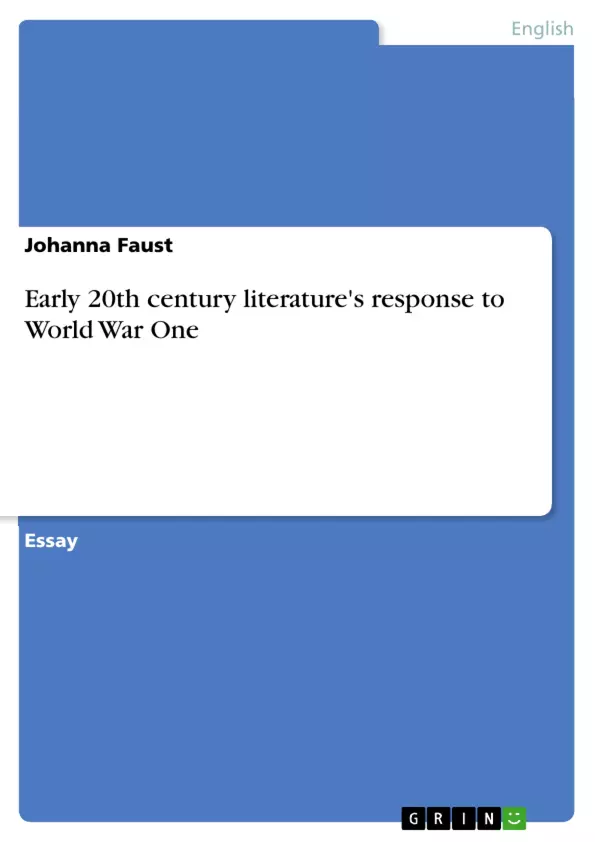In many ways, literature goes together with the current political events. After and during World War One it had a profound effect on the society and literature. People were first fascinated by the war due to the massive propaganda published by the governments, but shocked and feared of the horror they experienced during war time. Literature had changed dramatically and drastically when it came to war responses. It was mostly because the scale of damage was mostly unforeseen before the Great War. That’s why literature was strong and self-conscious after this catastrophe in the early twentieth century. “The Great War was, in cultural terms, the last nineteenth-century war, in that it provoked an outpouring of literature touching on an ancient set of beliefs about revelation, divine justice, and the nature of catastrophe.” For most of the writers it was hard to express all their feelings and experiences in long texts and novels. That’s why famous writers such as Virginia Woolf, T.S. Eliot and James Joyce used the form of poems and poetry to express their feelings about what happened to them and the society in World War One. In the following essay, we’re taking a closer look at these three writers and how they reacted to the First World War with literature.
Inhaltsverzeichnis (Table of Contents)
- Virginia Woolf
- Jacob's Room
- Mrs. Dalloway
- To the Lighthouse
- James Joyce
- Ulysses
- T.S. Eliot
- The Waste Land
Zielsetzung und Themenschwerpunkte (Objectives and Key Themes)
This essay explores the impact of the First World War on early twentieth-century literature by analyzing the works of Virginia Woolf, James Joyce, and T.S. Eliot. It examines how these writers responded to the catastrophe through their literary creations, showcasing the profound influence of the war on their themes and writing styles.
- The psychological impact of war on individuals and society
- The breakdown of traditional values and societal structures
- The search for meaning and purpose in a world marked by destruction
- The use of modernist techniques to express the fragmented and subjective nature of human experience
- The role of literature in mourning and remembering the losses of war
Zusammenfassung der Kapitel (Chapter Summaries)
Virginia Woolf
Jacob's Room
Woolf's "Jacob's Room" explores the life of a young man, Jacob Flanders, who struggles to connect his love for classic culture with the chaotic reality of society after World War One. The novel focuses on Jacob's development, portrayed through memories and sensations, highlighting the impact of the war on individual lives and the questioning of traditional beliefs.
Mrs. Dalloway
Published in 1925, "Mrs. Dalloway" delves into the life of Clarissa Dalloway, a housewife navigating the social landscape of post-war England. The novel portrays the violence and presence of death caused by the Great War, exploring themes of mourning, social criticism, and the psychological consequences of war on individuals, particularly through the character of Septimus, a traumatized war veteran.
To the Lighthouse
Woolf's "To the Lighthouse" (1927) examines the impact of World War One on the Ramsay family. The novel is divided into three parts, highlighting the gradual destruction caused by the war, the consequences of loss, and the characters' attempts to cope with their grief and find meaning in a world marked by the war's aftermath.
James Joyce
Ulysses
Written during the Great War, James Joyce's "Ulysses" focuses on a single day in the life of Leopold Bloom, a man navigating Dublin in 1904. The novel utilizes modernist techniques such as stream of consciousness and inner monologue to explore themes of consciousness, memory, and the complexities of human experience in a world shaped by the war.
Schlüsselwörter (Keywords)
Key terms and concepts explored in this essay include: World War One, Modernism, stream of consciousness, mourning, loss, social critique, psychological impact, fragmentation, subjective experience, traditional values, societal structures, and the search for meaning.
Frequently Asked Questions
How did World War One change early 20th-century literature?
The war caused a shift toward Modernism. Writers focused on fragmentation, the search for meaning in a destroyed world, and the psychological impact of trauma, moving away from 19th-century beliefs.
How does Virginia Woolf portray the war in "Mrs. Dalloway"?
Woolf uses the character of Septimus, a traumatized veteran, to show the psychological consequences of the war. The novel explores themes of mourning and social critique in post-war England.
What is the significance of T.S. Eliot's "The Waste Land"?
"The Waste Land" is a seminal modernist poem that captures the disillusionment and spiritual void felt by society after the catastrophe of the First World War.
Why did writers like James Joyce use modernist techniques?
Techniques like stream of consciousness and inner monologue allowed Joyce and others to express the fragmented and subjective nature of human experience in a chaotic world.
What role does "Jacob's Room" play in war literature?
In "Jacob's Room," Woolf explores the development of a young man whose love for classic culture clashes with the harsh reality of a society shattered by the Great War.
- Citation du texte
- Johanna Faust (Auteur), 2018, Early 20th century literature's response to World War One, Munich, GRIN Verlag, https://www.grin.com/document/453911



